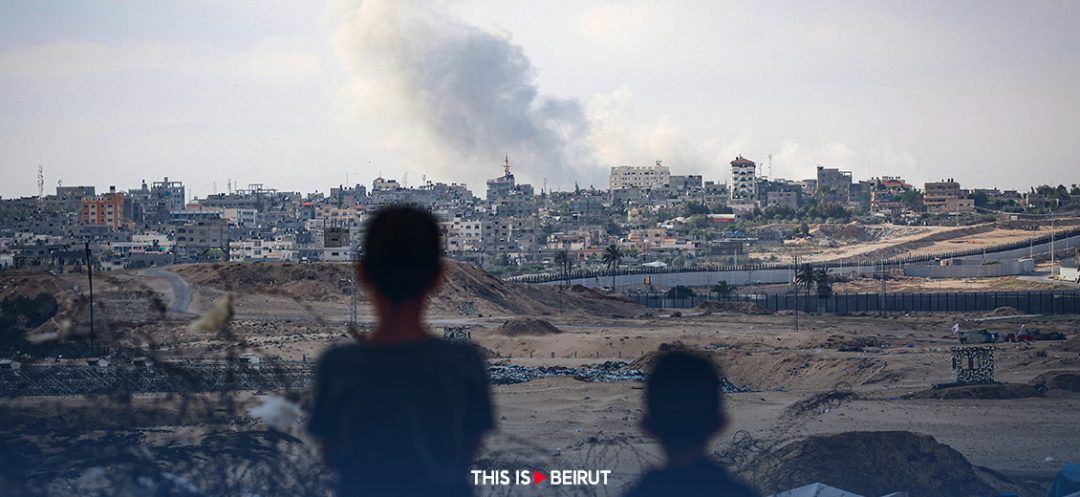- Home
- War in the Middle East
- Hamas Withdraws from Gaza Truce Talks Following Israeli Strike

©(AFP)
A Hamas official said Sunday the Palestinian group was withdrawing from Gaza truce talks, following a deadly Israeli strike that targeted militant commander Mohammed Deif more than nine months into the war.
The Islamist group's military chief Deif was "well and directly overseeing" operations, another Hamas official told AFP, despite the bombing raid on a southern Gaza displacement camp on Saturday, which Israel said was an attempt to kill him.
The first senior official from the Iran-backed group, whose October 7 attack on southern Israel sparked the war, said Hamas was pulling out of negotiations towards a ceasefire partly because of Israeli "massacres".
The health ministry in Gaza Strip said at least 92 people had been killed and 300 wounded in a strike on Al-Mawasi, an Israeli-designated "safe zone" on the Mediterranean coast.
Ismail Haniyeh, Hamas's Qatar-based political chief, told international mediators of the "decision to halt negotiations due to the (Israeli) occupation's lack of seriousness, continued policy of procrastination and obstruction, and the ongoing massacres against unarmed civilians", the official said.
But Hamas was "ready to resume negotiations" when Israel's government "demonstrates seriousness in reaching a ceasefire agreement and a prisoner exchange deal", the official quoted Haniyeh as saying.
Talks mediated by Qatar and Egypt, with United States support, have for months tried but failed to bring a halt to the war.
Israeli demonstrators, sometimes in the tens of thousands, have stepped up their actions demanding the government reach a deal to free the captives taken by Hamas on October 7.
An Israeli security source said that the Saturday strike showed Israel "will continue to target senior Hamas leadership" even as it "pursues negotiations for a hostage agreement".
Al-Mawasi, near the cities of Khan Yunis and Rafah, had in May been declared a safe humanitarian zone by the Israeli military, which told civilians to evacuate to it. However, there have been multiple deadly incidents there blamed on Israeli strikes.
Philippe Lazzarini, head of the UN agency for Palestinian refugees, UNRWA, said on social media site X: "The claim that people in Gaza can move to 'safe' or 'humanitarian' zones is false."
Israel said it had on Saturday targeted Deif, who heads the Ezzedine Al-Qassam Brigades, as well as an associate, Rafa Salama.
Israel's military on Sunday said Salama, commander of Hamas's Khan Yunis brigade, had been killed by a strike "in the area of Khan Yunis."
Israel accuses both Salama and Deif of helping to "mastermind" the October 7 attack.
Deif has been among Israel's most wanted men for decades and is blamed by Israeli authorities for the killings of multiple civilians and soldiers.
At the site of the strike, an AFP photographer saw the charred remains of tents as Palestinians searched through the wreckage for any salvageable items.
Plastic covers, broken water tanks and other equipment used for makeshift shelters was scattered on the sand.
Scott Anderson, director of UNRWA affairs in the Gaza Strip, said that on a visit to Khan Yunis's Nasser hospital, where many of the casualties were taken, he had "witnessed some of the most horrific scenes I have seen" in the war.
With AFP
The Islamist group's military chief Deif was "well and directly overseeing" operations, another Hamas official told AFP, despite the bombing raid on a southern Gaza displacement camp on Saturday, which Israel said was an attempt to kill him.
The first senior official from the Iran-backed group, whose October 7 attack on southern Israel sparked the war, said Hamas was pulling out of negotiations towards a ceasefire partly because of Israeli "massacres".
The health ministry in Gaza Strip said at least 92 people had been killed and 300 wounded in a strike on Al-Mawasi, an Israeli-designated "safe zone" on the Mediterranean coast.
Ismail Haniyeh, Hamas's Qatar-based political chief, told international mediators of the "decision to halt negotiations due to the (Israeli) occupation's lack of seriousness, continued policy of procrastination and obstruction, and the ongoing massacres against unarmed civilians", the official said.
But Hamas was "ready to resume negotiations" when Israel's government "demonstrates seriousness in reaching a ceasefire agreement and a prisoner exchange deal", the official quoted Haniyeh as saying.
Talks mediated by Qatar and Egypt, with United States support, have for months tried but failed to bring a halt to the war.
Israeli demonstrators, sometimes in the tens of thousands, have stepped up their actions demanding the government reach a deal to free the captives taken by Hamas on October 7.
An Israeli security source said that the Saturday strike showed Israel "will continue to target senior Hamas leadership" even as it "pursues negotiations for a hostage agreement".
'Horrific scenes'
Al-Mawasi, near the cities of Khan Yunis and Rafah, had in May been declared a safe humanitarian zone by the Israeli military, which told civilians to evacuate to it. However, there have been multiple deadly incidents there blamed on Israeli strikes.
Philippe Lazzarini, head of the UN agency for Palestinian refugees, UNRWA, said on social media site X: "The claim that people in Gaza can move to 'safe' or 'humanitarian' zones is false."
Israel said it had on Saturday targeted Deif, who heads the Ezzedine Al-Qassam Brigades, as well as an associate, Rafa Salama.
Israel's military on Sunday said Salama, commander of Hamas's Khan Yunis brigade, had been killed by a strike "in the area of Khan Yunis."
Israel accuses both Salama and Deif of helping to "mastermind" the October 7 attack.
Deif has been among Israel's most wanted men for decades and is blamed by Israeli authorities for the killings of multiple civilians and soldiers.
At the site of the strike, an AFP photographer saw the charred remains of tents as Palestinians searched through the wreckage for any salvageable items.
Plastic covers, broken water tanks and other equipment used for makeshift shelters was scattered on the sand.
Scott Anderson, director of UNRWA affairs in the Gaza Strip, said that on a visit to Khan Yunis's Nasser hospital, where many of the casualties were taken, he had "witnessed some of the most horrific scenes I have seen" in the war.
With AFP
Read more



Comments